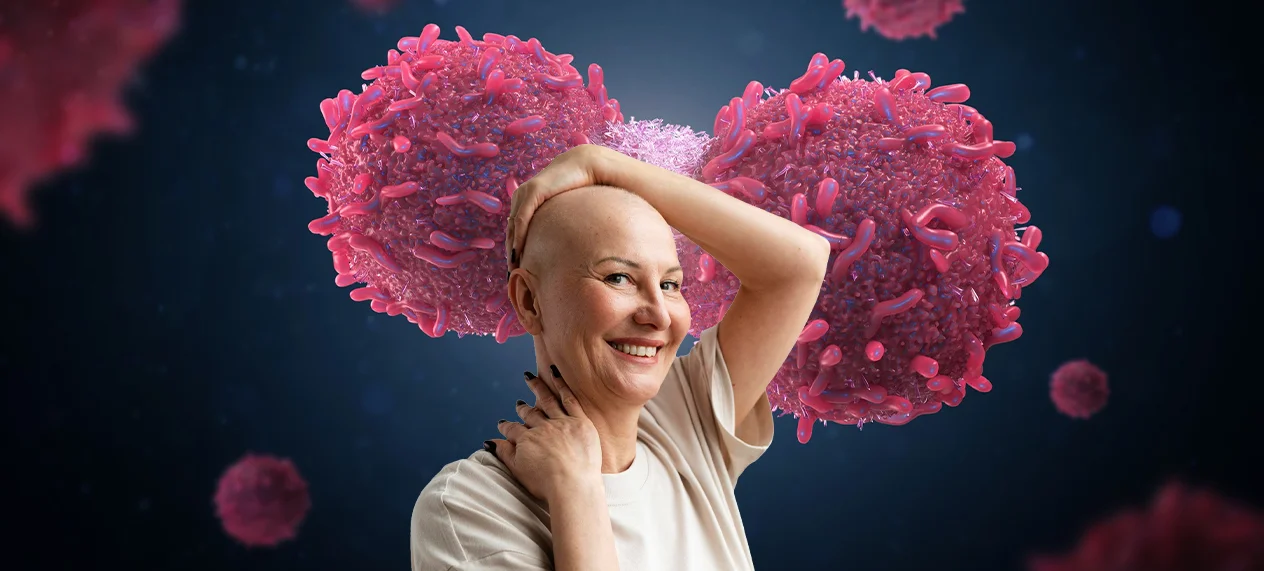
Cancer is one of the most common health challenges affecting millions of people worldwide. Cancer is not a single disease, but a collection of conditions in which cells of the body grow uncontrollably and metastasize to other parts of the body. Knowing what cancer is, warning signs, causes, and the types of cancer can help with early detection and treatment.
This blog will explain the basics: cancer symptoms, causes of cancer, and the types of cancer, covering common questions that people often ask.
Read Also: What The Stages Of Cancer Mean: A Simple Guide To Diagnosis And Treatment
Cancer starts when normal cells lose their ability to control growth and division. Instead of following the body’s signals to stop, abnormal cells multiply and form a lump or tumor. Some cancers form solid tumors, while other diseases of blood and bones, such as leukemia, do not form tumors.
Often when people search “what is cancer,” they want to know how cancer develops. Cells in our body grow, divide, and die in a controlled way. Cancer begins when there is a disruption in this cycle, and old or damaged cells do not die as they should, and new cells unnecessarily keep forming.
Read Also: Understanding Oral Cavity Cancer: Symptoms, Causes, and Care
Identifying signs of cancer can be difficult because many signs and symptoms are similar to those of an everyday illness. But, some of them should make you take notice.
Some of the more common cancer signs and symptoms include:
Although the signs and symptoms mentioned above may not mean cancer, they may be early indicators of cancer. Paying attention to your body is the first step to getting diagnosed as early as possible.
Read Also: Cancer In Young Adults: Understanding Risks, Early Detection, And Treatment
Here are some important signs and symptoms of cancer:
Listening to your body’s signals and seeking medical advice early can make a huge difference.
Read Also: How Lifestyle Changes Can Lower Your Cancer Risk
Individuals often question, "what are the causes of cancer?" The fact is that there is no one underlying factor. Cancer is usually induced as a result of a combination of lifestyle, genetics, and environmental factors.
Common causes of cancer include:
Researchers are continuing to study the association between causes and prevention of cancer, the bottom line is that avoiding known causes can significantly reduce risk.
When people ask the question, "how many types of cancer are there?" The answer is "more than 100." Each cancer type is named for the organ or type of cell in which it begins.
Some of the most prevalent cancer types are:
Knowing the various types of cancer can aid in helping a medical team determine a plan of treatment.
Every type of cancer presents different challenges. For example:
This shows how cancer types and symptoms vary greatly and why regular screening is important.
Identifying problems early increases the ability to treat them. Doctors typically use multiple modalities to treat cancer, such as:
Each treatment plan is individualized based on the stage of cancer, type of cancer, and overall patient health. Early detection of cancer symptoms and treatment planning can save lives.
If you're looking for a trustworthy healthcare provider, there are excellent cancer hospitals in Jaipur. Advanced medical technology, multidisciplinary teams, and compassionate care mean most patients can expect timely and accurate diagnosis and treatment.
Finding the best cancer hospital in Jaipur makes sure that patients are in good hands with oncologists, radiation therapy professionals, chemotherapy units, and counselling as needed, all important components of the cancer experience.
Q1: What is Cancer in simple terms ?
;A: Cancer is where cells of the body grow at an abnormal rate, form lumps or spread uncontrollably and compromise the function of the normal organ.
Q2: What are the early signs of Cancer ?
A: Some common early warning signs include: weight loss, lumps, unusual bleeding, changes in the skin, or persistent fatigue. However, these will vary with each type of cancer.
Q3: What causes Cancer ?
;A: The causes of cancer involve a combination of genetics, lifestyle habits, environmental exposure (smoking) and to a lesser extent viral or bacterial infections.
Q4: How many types of Cancer are there ?
;A: There are over 100 different types of Cancer, including Lung, Breast, Colorectal, Blood Cancers, and Neurological Cancers.
Q5: Can Cancer be prevented ?
A: Not all cancers can be prevented, but healthy lifestyle choices and routine check-ups decrease the risk for developing cancer, as well as avoiding tobacco products and early screening if symptoms arise.